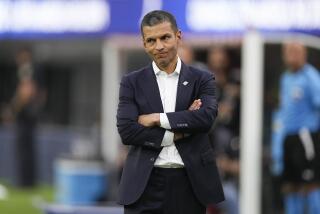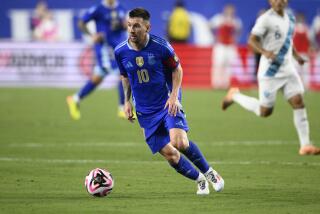Not What Doctor Ordered : World Cup: Road to the final was a rough one for Argentina, but Bilardo nursed team through.
- Share via
ROME — There must have been times during this World Cup when Carlos Bilardo wondered what possessed him to turn from medicine to soccer.
Bilardo is a doctor, but the patient he has had to nurse through this tournament--the Argentine national team--has taken one turn for the worse after another. It’s been enough to keep Bilardo, the team’s coach, awake long into the night.
And yet, on Sunday in Rome’s Olympic Stadium, Argentina will be playing West Germany in the World Cup final, trying to keep the trophy it won in Mexico four years ago.
“Half the team has physical problems,” Bilardo, 52, said before the tournament began. “It’s wounded, but not dead.”
Now, in Buenos Aires and throughout Argentina, Bilardo is being hailed for bringing this “half-dead” team back to life.
That was not the case a few weeks ago. Then, fans in Argentina were screaming for Bilardo’s head, suggesting that he had done nothing to prepare the team for the World Cup and was relying on players from the 1986 squad to see him through.
“There was no faith in my team back home until after the (quarterfinal) game against Yugoslavia,” Bilardo said.
The Argentines won that match on penalty kicks, then went on to defeat Italy on penalty kicks in the semifinals. Before that, they beat Brazil in what even Diego Maradona called a miracle.
Maradona, in decline and playing in what he admits will be his last World Cup, has shown courage, not brilliance, in this tournament. He has been fouled more often than any other player and has had to take pain-killing injections in his left ankle before every game.
Even so, he instills fear in defenders and doubts in the minds of opposing teams simply through reputation alone. But he agrees that, unlike 1986, Argentina has trodden a more difficult path to the 1990 championship game.
“This time we have tortured ourselves,” he said.
And tortured Italy, too, especially with the Argentine capacity for gloating. Italy has not taken kindly to losing what it considered “its” World Cup.
Read one headline in Tutto Sport: “Maradona is the devil.”
At the World Cup’s main media center in Rome, photographs of Maradona that remained undisturbed for weeks suddenly were defaced or torn down. Italians take their soccer seriously.
But then, Argentines do too.
“Our people are behind us now,” said goalkeeper Sergio Goycochea, hero of the two penalty shootouts. “When we came here, no one at home gave us a chance, and there was very little interest or support. We did not play well in the early games and bad things were said about us, but we have changed that. Now, everyone loves us.”
Part of Bilardo’s problem in the four years between World Cup tournaments was the unavailability of his top players. Almost every member of the 1986 team was snapped up by top European clubs that would not release them for national team duty.
“When I took over as coach (in 1983 from Cesar Luis Menotti, who led Argentina to its 1978 World Cup victory), people told me: ‘Argentina is an exporter of soccer players and that is going to be your main problem.’
“And they were right. Most of my first team are now playing abroad so that they can rarely train together. Often, as soon as I pick a new player he is transferred abroad.
“If I could have had all the players in Argentina, coming to play every Sunday and training together once a week . . . then I would be able to assure you that we would repeat in Italia ’90 what we accomplished in Mexico ‘86, that we would not be stopped by anyone.”
And yet, Bilardo has overcome even that handicap, as he has overcome the team’s spate of injuries. On Sunday, he has one last hurdle to clear: putting together a new lineup because four of his starting players are suspended.
The reason? Argentina’s overly physical--some would say dirty--style of play. Argentina has been given 20 yellow and red cards, five more than any other team in the tournament.
“I’m disappointed because we started the finals so well from a disciplinary point of view,” Bilardo said. “Then things started to go downhill.”
All the same, his words of May are ringing curiously true now that his team has reached the final.
That’s when he said: “When I succeed in uniting my players, it will remain to be seen whether they are the champions and the best in the world.”
The players are even beginning to believe it themselves. Destiny, it seems, is theirs, at least according to 1982 and 1986 World Cup veteran Sergio Batista.
“Few people believe in us,” he said. “But we’ll bring the World Cup home again. They say our team is old and beat up. I would say we’re experienced and ready to fight.”
The chances are, considering Argentina’s disciplinary record, that the West Germans had best be prepared for exactly that, a fight.
And what of the future? Will Bilardo step down after this tournament as so many other coaches plan to do? Not a chance.
“We are already thinking of 1994,” he said.
More to Read
Go beyond the scoreboard
Get the latest on L.A.'s teams in the daily Sports Report newsletter.
You may occasionally receive promotional content from the Los Angeles Times.






